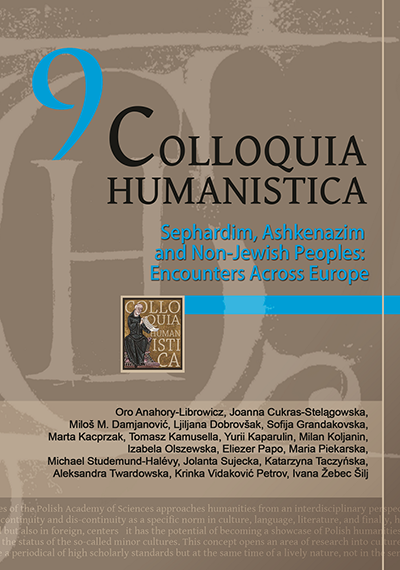Pamięć międzypokoleniowa: od czasów przed Holokaustem do okresu postjugosłowiańskiego
Transgenerational Memory: From Pre-Holocaust to Post-Yugoslavia
Author(s): Krinka Vidaković PetrovSubject(s): Jewish studies
Published by: Instytut Slawistyki Polskiej Akademii Nauk
Keywords: Holocaust; Yugoslavia; transgenerational memory; communicative memory; gender; biography; autobiography; hybrid genres
Summary/Abstract: The study focuses on Fanika as an example of documentary writing by firstand second-generation survivors, i.e. women in the mother-daughter relationship (Hanna Altarac/Fanika Lučić and Branka Jovičić), both from Sarajevo, Yugoslavia. The timeline of the life story of Hanna/Fanika, born in 1922 in a Sephardic family from Sarajevo, coincides on the macro level with the history of Yugoslavia (the establishment of the state and the interwar period, World War Two and the Holocaust, the postwar socialist period, the break-up of the country and post-Yugoslavia), which is important for the contextualization of the narrative. We have analyzed the motivation of first-generation survivor Fanika Lučić to present her memories of the Holocaust, highlighting the importance of communicative memory as an instrument of their transmission to a second-generation survivor as well as the process involved in their transfer from private to public narrative. Further analysis refers to the generic frames of the narrative, its hybrid character, and its liminal position at a point where biography and autobiography meet and interact. Mediation is a key procedure in Fanika, so attention has been dedicated to determining the degrees of mediation, their variation throughout the narrative and their impact on the substructures (narrative segments). Finally, we have identified, interpreted, and contextualized several gender markers appearing at various levels of the text. In conclusion, the book was designed not only to transmit the Holocaust testimony of Fanika Lučić, but also to provide a biographical account of her life in socialist Yugoslavia, her experience of the war in Bosnia, and the final phase of her life as a Canadian immigrant. Transgenerational memory and gender play a key role in the hybrid structure of this book, which is a welcome contribution to Yugoslav Holocaust literature.
Journal: Colloquia Humanistica
- Issue Year: 2020
- Issue No: 9
- Page Range: 33-54
- Page Count: 22
- Language: English

